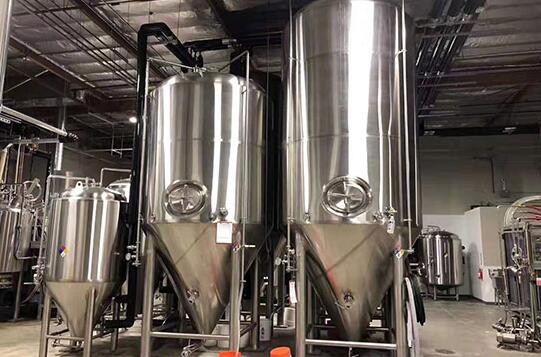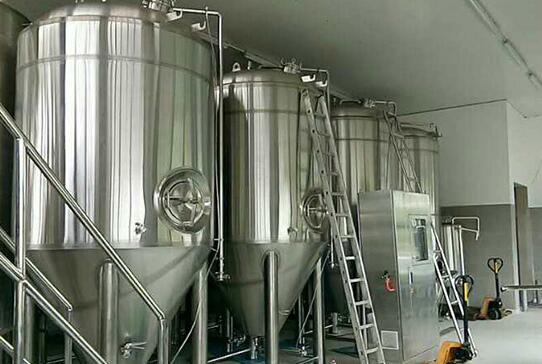Will conical fermenters make you drink better beer?
In this article, we focus on the advantages and disadvantages of conical fermenters in commercial brewing to help you determine if a conical fermenter is worth buying.
Conditions that need to be met for a fermenter
There are three conditions that need to be met when choosing a fermentation vessel.
1. It removes sediment and dead yeast from the bottom of the tank and allows for complete drainage of the beer for bottling or conditioning. This is the greatest use of a conical fermenter.
2. You also need to make sure that the yeast is not disturbed during the beer fermentation process. Yeast are very temperamental. They like to work alone and do not want to be disturbed by microorganisms.
3. Stable, low temperatures. The average fermentation temperature range for beer is 64 to 72°F (18 to 22°C), while lagers require lower temperatures, from 45 to 55°F (7 to 13°C).
Conical fermenters
Most professional brewers no longer use open top and flat bottom fermenters, but instead use closed conical fermenters. Conical fermenters have a conical bottom that allows yeast to settle and collect. Typically, a conical fermenter will have two taps, one at the top of the cone and one at the bottom. The top tap removes the clear beer and the bottom tap removes everything. Conical fermenters allow easy collection of yeast, minimize contact with bacteria and oxygen, and are easy to see the attraction.
Temperature control in the conical fermenter can be achieved by coils inside the fermenter or by a jacket on the outside. If the fermenter needs to be cooled, this is accomplished by circulating cold water or glycol inside the jacket. We recommend using a conical fermenter with an outside jacket because it is more convenient to use and easy to clean and sterilize.
Advantages of conical fermenters
◮ Yeast can be easily cut and collected for reuse. Conical fermenters make harvesting yeast as easy as turning a valve. The collected yeast is healthy and viable, and these yeasts are easy to separate, clean and store.
◮ Yeast can be easily removed and the beer can be conditioned and clarified in the vessel without fear of yeast autolysis. In large breweries, it is common to condition bright tanks and then release the fermenter for a new fermentation process.
◮ Dry hop debris can be removed through the cone, making it easier to manage multiple dry hop additives.
◮ Professional brewers can control the fermentation process. Stainless steel conical fermenters can be fitted with a wide range of accessories, offering a variety of features for brewers to control the fermentation process. You can add accessories such as aeration/charring, pressure gauges, rotary valves, sampling valves and more, giving you great control and a large number of interchangeable components.
◮ Adding unitank to a conical fermenter allows you to ferment under pressure and naturally add carbonation to your beer. Pressure fermentation allows you to ferment at warmer ambient temperatures while inhibiting ester formation. This is beneficial for those who do not have a glycol system or a large enough refrigerator. Pressure fermentation also allows you to produce beer within the temperature range of your malt liquor.
◮ Top taps allow samples to be collected without any yeast, so it is easier to monitor beer gravity.
◮ Beer can be removed by pressure or gravity from the top tap, eliminating the need for siphoning equipment.
Disadvantages of conical fermenters
◮ Conical fermenters are expensive. In general, stainless steel conical fermenters are more expensive than regular fermenters. However, it will provide you with the benefit of value for money.
◮ Because of the generally large size of conical fermenters, most conical fermenters require very large fermentation chambers or glycol systems to maintain fermentation temperatures. This is another very expensive part of starting a brewery. This is because cooling solutions can agree to be expensive. But the good news is that most glycol cooling units can be used to cool multiple fermenters.
◮ Conical fermenters have more parts that need to be cleaned and sanitized, so their cleaning process is very complicated. But to be honest, it's not as complicated as it seems at first glance, and brewing is always accompanied by a lot of cleaning and sanitizing. Fortunately, the Clean-In-Place (CIP) system makes cleaning much easier.
Will conical fermenters make you drink better beer?
Will conical fermenters help you brew better beer? I think it depends on the type of beer you are brewing. When brewing delicate styles such as IPAs, a conical fermenter will help a lot. When removing oxygen is the first priority, a conical fermenter gives you the absolute maximum control. Conical fermenters are always going to be the more complex piece of equipment for this job, but in reality, you may not always be able to taste the difference. A conical fermenter alone may not allow you to brew great beer directly, but it will make it easier to do so.
Generally speaking, you need to determine what is worth it to you. You can't say that people who buy a conical fermenter will end up disappointed, and you can't say that people who buy a conical fermenter will be successful. If you intend to become a professional brewer, you need to have the same level of competence and control as a professional brewer, and these tools will help you achieve that goal at a higher level. In terms of value, a conical fermenter is totally worth the money.
If you are ready to open a craft brewery, you can contact us. ZYBREW's engineers will provide you with a list of craft beer equipment and related pricing. Of course, we can also provide you with professional turnkey brewery solutions, so you can spend more time focusing on making great beer. zybrew is looking forward to working with you!


评论
发表评论